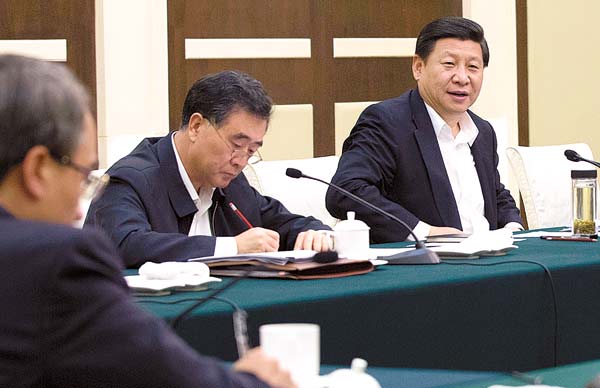Xi's visit signals reform support
Updated: 2012-12-11 03:13
By GAO CHANGXIN and Zhao Lei (China Daily)
|
||||||||
In what is being widely interpreted by analysts as a political signal, Xi Jinping conducted his first official trip as new Party chief to Guangdong, the southern province where China's market-oriented reforms were launched.
Due to its proximity to Hong Kong, Guangdong was chosen as the testing ground by Deng Xiaoping three decades ago for "reform and opening-up".
 |
|
Xi Jinping, general secretary of the Communist Party of China Central Committee, and Wang Yang, Party chief of Guangdong, meet with government officials and business leaders in Guangdong province on Sunday. [Photo/Xinhua] |
Xi met with business leaders in Guangzhou on Sunday in the run-up to the annual high-level Central Economic Work Conference scheduled to convene later this month, the Xinhua News Agency reported on Monday.
Xi was elected as the General Secretary of the Communist Party of China Central Committee at the Party's 18th National Congress last month.
In his meeting with the business leaders he stressed the importance of healthy and sustainable development.
He also said China must "focus clearly" on the ever-changing global situation. While the achievement and long-term fundamentals of the economy must be recognized, China must also be aware of potential obstacles, he said.
China must not attempt to ignore its problems and must "strive for the best but be prepared for the worst", he said.
Difficulties and challenges, as well as advantages and opportunities, should be taken into account to promote healthy economic growth, Xi said.
In the face of complicated and fluid conditions, confidence and awareness of risks are needed to make progress while ensuring stability, he noted.
"We should remain cool-headed. We should acknowledge the economic and social achievements we have made so far and recognize that the long-term fundamentals will remain sound," he said.
"Meanwhile, we should also recognize that adverse domestic and overseas conditions will be long-term. We should not run from challenges nor cover up problems,'' he said.
Xi also urged accelerating economic restructuring and pushing innovation forward. These goals were imperative, he said.
After listening to opinions at the meeting about the economy, Xi urged the relevant departments to solve problems through, among other things, deepening reform and enhancing law enforcement.
Before the meeting, Xi visited Shenzhen, the first special economic zone.
He was quoted during the visit as encouraging people to rapidly quicken reform. The visit was seen by observers as echoing a similar trip in 1992 by Deng, which revived the country's then-stalled reforms.
Li Chengyan, a professor with the school of government at Peking University, told China Daily: "Guangdong is the forerunner of China's reform and opening-up, and has been actively carrying out economic and political structural reform.
"So the selection of Guangdong for his first inspection tour (as the general secretary of the CPC Central Committee) shows Xi endorses the province's achievements over the past three decades. And at the same time, the move indicates his high expectations of Guangdong's future development and the deepening reforms."
The Nanfang Daily quoted Xi as saying, on his Shenzhen visit, that new ground will be broken.
"The Party Central Committee's decision to undertake reform and opening-up was correct. We will continue down this path, unswervingly continue enriching the country and the people and will break new ground."
Newspapers in Hong Kong reported that Xi laid flowers by a statue of Deng in Shenzhen.
Wen Wei Po, a newspaper in Hong Kong, said that Xi also visited a former fishing village in Shenzhen, a symbol of the success of the economic policy that Deng championed.
Before arriving at Guangzhou, Xi visited the cities of Zhuhai and Shunde. Xi kept his visits low-key, to conform to the "eight rules" published days earlier that urged the end of pomp and ceremony.
Footage aired by Hong Kong television shows Xi using a small coach during his visit to Shenzhen and waving to passers-by.
Xi said his meeting with entrepreneurs in Guangzhou was aimed at finding out what criticisms would be aired and suggestions to fix any problems.
He pledged that the government will seriously study problems that were pointed out and come up with appropriate solutions.
The economy has regained some momentum after it cooled down in the first three quarters of the year. Economists expect GDP growth to rise from the third quarter's 7.4 percent year-on-year to around 8 percent in the fourth quarter.
Barclays Bank wrote in a research note on Monday that the government is to retain its 7.5 percent growth target and 4 percent inflation target for next year.
Fiscal policy is likely to remain proactive, but monetary policy probably has already returned to neutral. It said that continuity and stability of macroeconomic policy will be a priority and there will be no aggressive stimulus measures next year.
Contact the writers at gaochangxin@chinadaily.com.cn and zhaolei@chinadaily.com.cn
Xinhua contributed to this story.

 Relief reaches isolated village
Relief reaches isolated village
 Rainfall poses new threats to quake-hit region
Rainfall poses new threats to quake-hit region
 Funerals begin for Boston bombing victims
Funerals begin for Boston bombing victims
 Quake takeaway from China's Air Force
Quake takeaway from China's Air Force
 Obama celebrates young inventors at science fair
Obama celebrates young inventors at science fair
 Earth Day marked around the world
Earth Day marked around the world
 Volunteer team helping students find sense of normalcy
Volunteer team helping students find sense of normalcy
 Ethnic groups quick to join rescue efforts
Ethnic groups quick to join rescue efforts
Most Viewed
Editor's Picks

|

|

|

|

|

|
Today's Top News
Health new priority for quake zone
Xi meets US top military officer
Japan's boats driven out of Diaoyu
China mulls online shopping legislation
Bird flu death toll rises to 22
Putin appoints new ambassador to China
Japanese ships blocked from Diaoyu Islands
Inspired by Guan, more Chinese pick up golf
US Weekly

|

|






